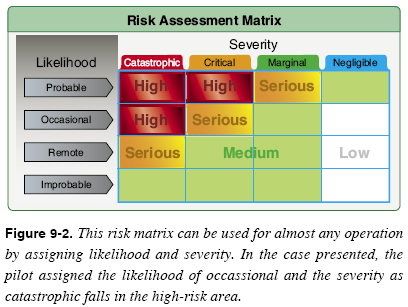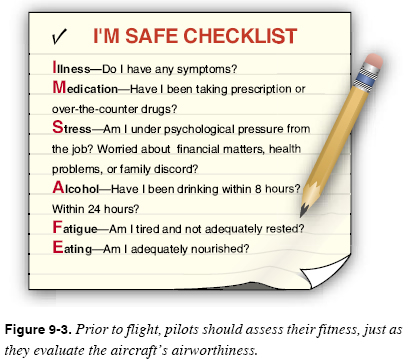| Chapter 9. Risk Management
Severity of an Event
The next element is the severity or consequence of a pilot’s action(s). It can relate to injury and/or damage. If the individual in the example above is not an instrument flight rules (IFR) pilot, what are the consequences of encountering inadvertent IMC? In this case, because the pilot is not IFR rated, the consequences are catastrophic. The following are guidelines for this assignment.
- Catastrophic—results in fatalities, total loss
- Critical—severe injury, major damage
- Marginal—minor injury, minor damage
- Negligible—less than minor injury, less than minor system damage
Simply connecting the two factors as shown in Figure 9-2 indicates the risk is high and the pilot must either not fly or fly only after finding ways to mitigate, eliminate, or control the risk.

Mitigating Risk
Risk assessment is only part of the equation. After determining the level of risk, the pilot needs to mitigate the risk. For example, the pilot flying from point A to point B (50 miles) in MVFR conditions has several ways to reduce risk:
- Wait for the weather to improve to good visual flight rules (VFR) conditions.
- Take a pilot who is rated as an IFR pilot.
- Delay the flight.
- Cancel the flight.
- Drive.
IMSAFE Checklist
One of the best ways that single pilots can mitigate risk is to use the IMSAFE checklist [Figure 9-3] to determine physical and mental readiness for flying:

- Illness—Am I sick? Illness is an obvious pilot risk.
- Medication—Am I taking any medicines that might affect my judgment or make me drowsy?
- Stress—Am I under psychological pressure from the job? Do I have money, health, or family problems? Stress causes concentration and performance problems. While the regulations list medical conditions that require grounding, stress is not among them. The pilot should consider the effects of stress on performance.
- Alcohol—Have I been drinking within 8 hours? Within 24 hours? As little as one ounce of liquor, one bottle of beer, or four ounces of wine can impair flying skills. Alcohol also renders a pilot more susceptible to disorientation and hypoxia.
- Fatigue—Am I tired and not adequately rested? Fatigue continues to be one of the most insidious hazards to flight safety, as it may not be apparent to a pilot until serious errors are made.
- Eating—Have I eaten enough of the proper foods to keep adequately nourished during the entire flight?
|

